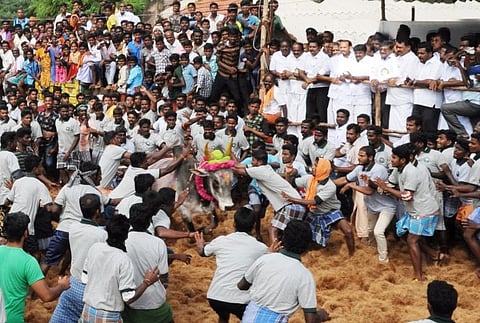

As the standoff between the protesters and the police comes to an end in Tamil Nadu, one question that has been raised multiple times is whether the state's jallikattu Act will permanently revoke the ban on jallikattu.
While some protesters say that anything other than removing the bull from the list of performing animals is only a temporary quick fix, the government has been insisting that the Act will be a permanent measure.
It's now confirmed that as per the amendments to the Prevention of Cruelty to Animals Act, 1960 made by the TN jallikattu Act, the rules for performing animals will not apply to bulls used for jallikattu.
TNM has a copy of the Act, which amends six sections of the original PCA Act to make jallikattu legal in Tamil Nadu.
The explanation given in the Act for allowing jallikattu is that it plays a vital role in preserving and promoting the culture and tradition in large parts of the state of Tamil Nadu. The Act also says that jallikattu is vital for the survival and continuance of native breeds of bulls.
The Act defines jallikattu to include manjivirattu, vadamadu and erudhuvidumvizha (not rekla), and it exempts the bull taming sport from the rules for performing animals. The Act also ensures that those conducting jallikattu will not face any punishment under the original PCA Act, but only under the state government rules which were notified on Sunday.
This is what the TN Amendments Act has modified in the Prevention of Cruelty to Animals Act, 1960:
1. The PCA Act restricts the exhibition and training of performing animals - as per the list maintained by the central government. The TN law has now amended this to say that this rule will not apply to the conduct of jallikattu - meaning bulls used for jallikattu will now be excluded from following these rules.
Section 22: Restriction on exhibition and training of performing animals.
Provided that nothing contained in this section shall apply to the conduct of Jallikattu.
2. In the original PCA Act, Section 11 deals with punishment for those who treat animals cruelly, and it also lists out the exceptions where the punishment will not be applicable. The Tamil Nadu amendment adds jallikattu to the list of exceptions - meaning, these punishments will not apply to those conducting jallikattu.
Section 11 (3): Nothing in this section shall apply to -
(f): The conduct of Jallikattu with a view to follow and promote tradition and culture and ensure preservation of native breeds of bulls as also their safety, security and well being.
3. The amendment also adds a section to the Miscellaneous chapter of the PCA Act, which says that conducting jallikattu will not be an offence under this Act. That doesn’t mean there will be no punishments at all. The state government has notified a certain set of rules for those conducting jallikattu, and people violating these rules will be punished accordingly.
Section 28-A: Saving in respect of Jallikattu - nothing contained in this Act shall apply to Jallikattu conducted to follow and promote tradition and culture and such conduct of Jallikattu shall not be an offence under this Act.
4. The amendment defines ‘Jallikattu’ as “an event involving bulls conducted with a view to follow tradition and culture” and includes manjuvirattu, vadamadu and erudhuvidumvizha. The original PCA Act did not define the term, and this addition makes it possible for the government to make the other amendments to the Act.
Section 2 (dd): “Jallikattu” means an event involving bulls conducted with a view to follow tradition and culture on such days from months of January to May of a calendar year and in such places, as may be notified by the State government, and includes “majuvirattu”, “vadamadu”, and “erudhuvidumvizha”.
5. The original PCA Act says it is the duty of anyone having charge of animals to ensure their well-being, and prevent the infliction of unnecessary pain and suffering on the animals. The amendment adds a second clause to this section, which ensures that jallikattu will be permitted in the state.
Section 3 (2): Notwithstanding anything in sub-section (1), conduct of ‘Jallikattu’, subject to such rules and regulations as may be framed by the State Government, shall be permitted.
6. There are also some overall exemptions in the chapter on performing animals in the PCA Act. Jallikattu is now one of them, since it promotes tradition and ensures the survival of native breeds of bulls.
Section 27: Exemptions:
(c) the conduct of Jallikattu with a view to follow and promote tradition and culture and ensure survival and continuance of native breeds of bulls.
On Monday, the Tamil Nadu Assembly had passed the law to amend the central Prevention of Cruelty to Animals Act, allowing the conduct of jallikattu in the state. This came 2 days after the Governor promulgated an ordinance for the same.
There was a massive standoff between the protesters and police in Tamil Nadu on Monday, especially in Chennai and Alanganallur. Protesters and police have pelted stones at each other, police vehicles in Triplicane have been set on fire, and the cops have lathicharged protesters at Alanganallur, including women.
Most of the protesters called off their agitation on Monday evening, after the Prevention of Cruelty to Animals (Tamil Nadu Amendment) Act was passed in the state Assembly.